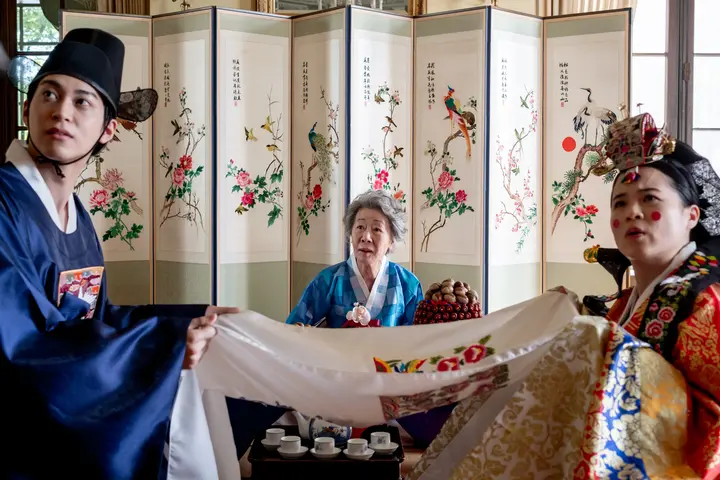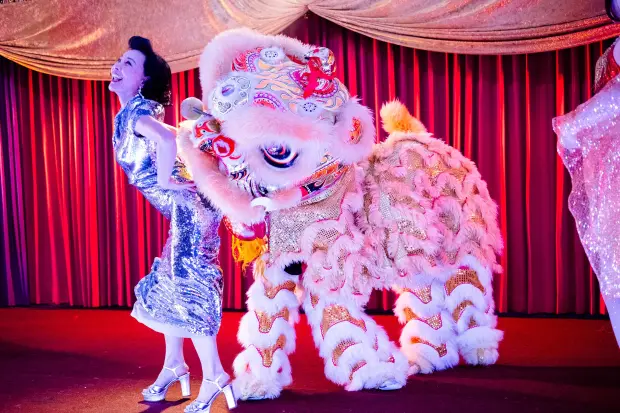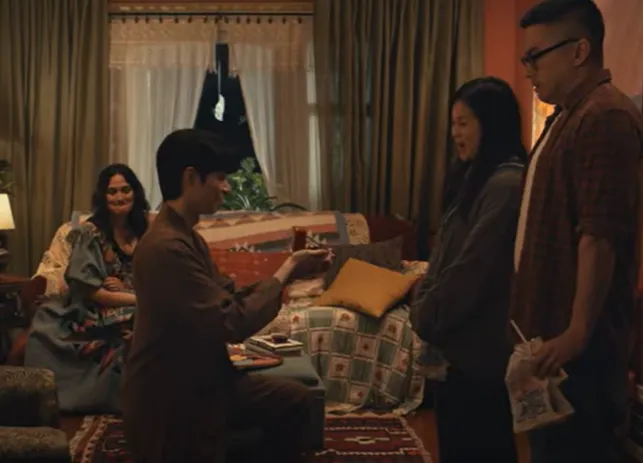If you’ve ever wanted a Queer romantic dramedy starring Lily Gladstone and Kelly Marie Tran, directed by Andrew Ahn, one of the best directors working today, then is today you’re lucky day. Mine too, because I also love those things!
The Wedding Banquet is a remake of the 1993 Ang Lee movie of the same name. Ahn and his co-writer James Schamus, the co-writer and producer of the original, update the story for 2025. Depressingly little has changed in some cases, yet, the film is starkly modern in others. The duo take the shenanigans of a screwball romance and find the drama between the antics, making the characters less archetypes and more lived in.

Ahn brings his deft touch and humanistic approach to the story, and finds humor in the everyday aspects of being gay, in Washington state, in America, and not being white, all at the same time. The characters have to navigate their personal playland of neurosis while trying to unpack the baggage of of their culture and childhood.
Lee (Lily Gladstone) is frustrated by her girlfriend Angela (Kelly Marie Tran) and her tendency to silently simmer. It doesn’t help that their best friend and quasi roommate, Chris (Bowen Yang), who lives in their shed with his boyfriend Min (Han Gi-Chan), has the same problem. Lee is more open and expressive like Min, leading the duos to often fraction off and use the other as a couples counselor.
Ahn and Schamus take a plot straight out of a wacky rom-com queer fanfic and find ways to show humanity and complexity. Lee and Angela are trying to have kids, with Lee’s second IVF attempt having just failed. Min is a wealthy Taiwanese immigrant here on a student visa who is facing pressure to return to Taiwan and marry, as his visa is running out. The solution? Min should marry Angela. In exchange, he will pay for Lee’s IVF with the marriage to Angela also solving his green card issues. Neither Angela nor Chris are happy with this.
All of this unfolds not in the wacky frantic pacing one would expect but, instead, glides along with keen observant eye for human behavior. The Wedding Banquet treats the situations not as wacky but as real hurdles to overcome with tangible stakes. Ahn and Schamus trade wit for punchlines. “Queer theory takes the fun out of being gay.” The wit of the script finding ways to kid modern Queer culture while also sighing in exasperation that these hurdles still have to be cleared.
The seemingly simple idea only becomes more complicated when Min’s grandmother Ja-Young (Youn Yuh-jung) demands to come to witness the wedding. The old woman wasn’t born yesterday and senses that Min is not telling her everything. Her arrival throws what is meant to be a simple and harmless bureaucratic con into a pageant requiring more actors than the road company had originally counted on.
Now they need to bring in Angela’s mother May (Joan Chen), after all the bride’s mother must be involved. The problem is that May has just accepted an ally award from the local Queer activist group and despite Angela’s pleas, won’t stop gushing about how proud she is of being a mom of her out Gay Asian daughter. This is where The Wedding Banquet finds its comedy-and its drama.

Not in the wacky situations but in how the characters relate to each other. Angela is irritated by her mother’s pride because she remembers when she wasn’t proud and feels as if she’s taking applause for an attitude she adopted too late. Lee is heartbroken that her IVF failed but is confused why Angela seems so nonplussed when she suggests she that Angela take the next IVF. The characters of The Wedding Banquet are not hiding anything but they aren’t being totally honest with each other or themselves and that’s where the laughs come from-not at their expense-but at the recognition of their human frailties.
The joke isn’t that May is happy to support her gay daughter entering into a sham marriage. But rather from how she just won an award for being such a good gay mother. What is she going to tell the other mothers at PFLAG?
Ahn uses Ki Jin Kim’s camera as a paintbrush to create little moments that reach out across the film. Characters reveal themselves to each other in quiet exchanges, haltingly, afraid they might break being so vulnerable. Ki Jin’s camera takes scenes like the one between Youn and Han and makes them aching and tender as they open up long buried secrets to one another.
Underneath The Wedding Banquet hums the quiet stinging observation of how binary the straight world views queerness. May’s fear of her fellow allies finding out her gay daughter is married to a man for example is funny not because it’s erasing bisexuality, but because it shows how exasperatingly narrow enlightened straight people’s view of queerness is.
My favorite character was Bobo Le as Kendall a non-binary Queer woman who is like a sibling to Chris. Ahn comes dangerously close to underusing them. “Oh! She’s going to have fourteen non-binary children!” To say nothing of being my favorite character, as they bring an infectious energy to every scene they’re in. Kendall grounds Yang’s character and shows that despite his fear of the unknown he is capable of taking on challenges.
If there is a weak spot in The Wedding Banquet, it’s Yang’s Chris. His character seems the most underwritten. Or it could be because his arc of a commit-a-phobe who doesn’t want to marry his rich, sexy boyfriend is the least interesting because everyone else is screaming what a fool he is. (Including me in an empty theater.) Again, he’s shown he’s up to the challenge of tackling difficult situations, but it never feels as if the script or Ahn make a strong enough case for him. Leaving Yang to do most of the heavy lifting and he noticeably struggles at points. Yang does a good job playing a mostly dramatic role, but at times it feels as if Chris’s motivation is less dramatic. However, almost every scene in which Yang is paired with someone else sings, showing a generosity of performance by the cast and Yang himself.

The cast in general is uniformly excellent. Ahn, one of the best directors for actors working today, creates fertile scenes that allow each character to shine. Gladstone and Tran make for a believable couple, arguing and making up, with the comfort of a love every bit as grand as what you see in movies, just not as dramatic. The scene where Gladstone’s Lee tells Angela about her father and the Duwamish ancestry tied into the land and the house is another example of Ahn and Schamus highlighting the differences in culture while tying them together in the quest for family and a home.
Jokes like the gang trying to straight-wash Angela and Lee’s house would be dated in anyone else’s hands but Ahn and Schamus never let the gags fall flat. Gladstone’s Lee using her body to block a painting that Angela, Chris, and Min, want to take down like a protester is hilarious. As is Gladstone’s impassioned and righteous tone as she declares, “It ties the room together!”
Of course, there are misunderstandings, some bed hopping, and secrets are dragged out of the closet, but in the end there is happiness. Because in the end, they have each other, something even Grandma Ja-Young is jealous of.
Images courtesy of Bleecker Street
Have strong thoughts about this piece you need to share? Or maybe there’s something else on your mind you’re wanting to talk about with fellow Fandomentals? Head on over to our Community server to join in the conversation!

